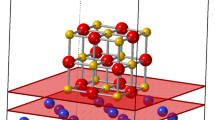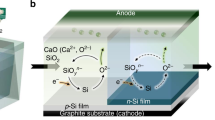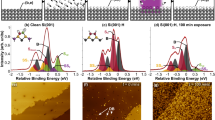Abstract
EPITAXIAL layers of silicon have been prepared by the hydrogen reduction of silicon tetrachloride at raised temperatures1,2. The rate of deposition of silicon is dependent on the total gas flow-rate, the molecular percentage of silicon tetrachloride in the hydrogen and on the silicon substrate temperature.
This is a preview of subscription content, access via your institution
Access options
Subscribe to this journal
Receive 51 print issues and online access
$199.00 per year
only $3.90 per issue
Buy this article
- Purchase on Springer Link
- Instant access to full article PDF
Prices may be subject to local taxes which are calculated during checkout
Similar content being viewed by others
References
Theuerer, H. C., J. Electrochem. Soc., 108, 649 (1961).
Mark, A., J. Electrochem. Soc., 107, 568 (1960).
Atalla, M. M., Tannenbaum, E., and Scheibner, E. J., Bell System Tech. J., 38, No. 3, 749 (1959).
Liimatainen, T. M., Proc. Inst. Elec. Eng., 106, B, 385 (1959).
Author information
Authors and Affiliations
Rights and permissions
About this article
Cite this article
JOYCE, B., BALDREY, J. Selective Epitaxial Deposition of Silicon. Nature 195, 485–486 (1962). https://doi.org/10.1038/195485a0
Issue Date:
DOI: https://doi.org/10.1038/195485a0
This article is cited by
-
Design of Concentric Cylindrical Surrounding Double-Gate (CSDG) MOSFETs – A Fabrication Perspective in Nanoscale Regime
Silicon (2023)
-
Crystallographic tilt in GaN layers grown by epitaxial lateral overgrowth
Science in China Series A: Mathematics (2002)
-
Effects of mesa area and orientation on defects in strained InxGa1−xAs films grown by LPOMCVD
Journal of Electronic Materials (1991)
Comments
By submitting a comment you agree to abide by our Terms and Community Guidelines. If you find something abusive or that does not comply with our terms or guidelines please flag it as inappropriate.



